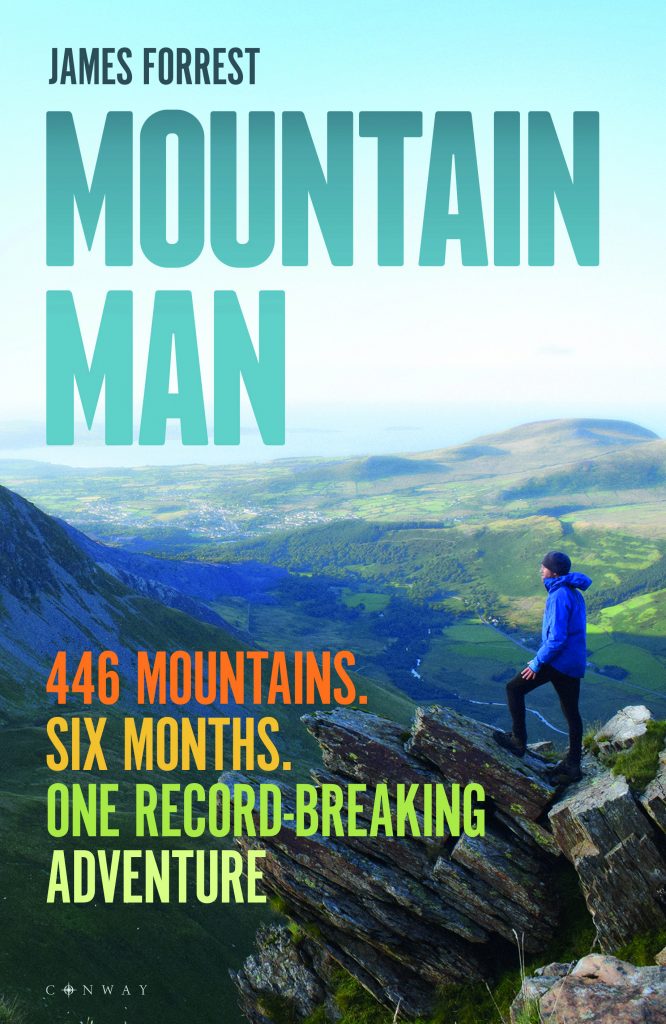
Given the times in which we currently dwell, perhaps more so than at any other time in our lives the appeal of getting out into nature and experiencing the freedom and adventures to be had has never been stronger. One man who changed everything about his life to do just that is James Forrest. He took the decision to leave the safety of a steady office job in the city and sell his house in exchange for following his dream of a life filled with adventure.
After a year travelling the world James set himself the monumental challenge of climbing all 446 mountains in England and Wales over a six month period, in what became a gruelling record breaking achievement. The triple-crown of peak-bagging expeditions saw James walk almost 5,000km and climb the height of Everest from sea level more than 30 times. And aside from the honours in the record books, the challenge also proved to be a life affirming endeavour and transformative in terms of James’ mental health and happiness.
Since his initial undertaking James has summited 273 mountains in Ireland and Northern Ireland, and 282 in Scotland, taking his total to 1,001 mountains climbed across the UK and Ireland. No person has ever achieved this feat in a faster time.
We caught up with Mountain Man James earlier in the year to talk about where his passion for mountains came from, the mental challenges he faced along the way and what he’s learned from his amazing experiences.
The MALESTROM: What was the catalyst that led to you taking on these challenges?
James Forrest: I grew up in Birmingham, I’d always loved the outdoors and going on walks in the countryside with my Grandparents. I was always really active and played outside.
As a little boy, I thought I’d have quite an adventurous, outdoorsy existence when I grew up, but fast forward to me turning thirty post-Uni, I’d ended up spending ten years in Birmingham, worked as a manager in the charity sector in a very office-centric environment sat at a desk staring at a computer sending endless emails, going to meetings and pushing paper around.
I’d accidentally fallen into all of that, it had never been a life plan, I’d just been trying to get a decent job and pay-packet so I could buy a car and get a house. I was in a serious relationship and real-life was taking over. I was fed up with that, I was depressed and wasn’t happy with the life I’d created for myself.
My ten-year-old self who loved exploring was still within me and wasn’t happy with the existence I’d created. Everyone thinks there might have been this crazy breaking point that pushed me into living more adventurously, but it didn’t really work like that.
It was more of a longer-term process. I’d thought about making a change for ages, but it was quite a daunting thing to do. You wonder if you’re going to screw your life up and cripple myself financially.
TM: It’s a brave move as most people with a safe job wouldn’t even think of taking on epic adventures…
JF: Yes, I guess so. I eventually did pluck up the courage and did that classic thing that people thinking about doing something like this might do. I thought about travelling around the world, so I sold my house, left my job and decided on this big adventure.
I didn’t have a gap year aged 21 like some do, so I had one aged 30. I went travelling around the world and thought this was going to be the great adventure, which in some ways it was, but it was completely unsustainable. I got home and thought, that was great, an amazing escape, but not I’m back to reality, I’d blown loads of money I’d saved up over the last ten years, what do I do next?
I still had this real wanderlust and love for the outdoors. The year away didn’t quench that, it made it stronger. So I was meditating on how I was going to redesign my life, what I was going to do next.
I definitely didn’t want to go back to my old job and old house and feel like I was just regressing. So, it was then that I moved to The Lake District, got a part-time job there and made some big life changes. But I still wanted to have a big grand adventure and hit those dizzying heights I’d hit when travelling.
I came up with this idea of trying to bag this list of mountains, The Nuttalls, which are 446 mountains in England and Wales. I wanted to try and do that around the job that I’d got so I just did it on my days off and in my holidays. It was my attempt to see if you could integrate a big adventure with everyday life. I started that in 2013 and it triggered this journey I’ve been on over the last years.
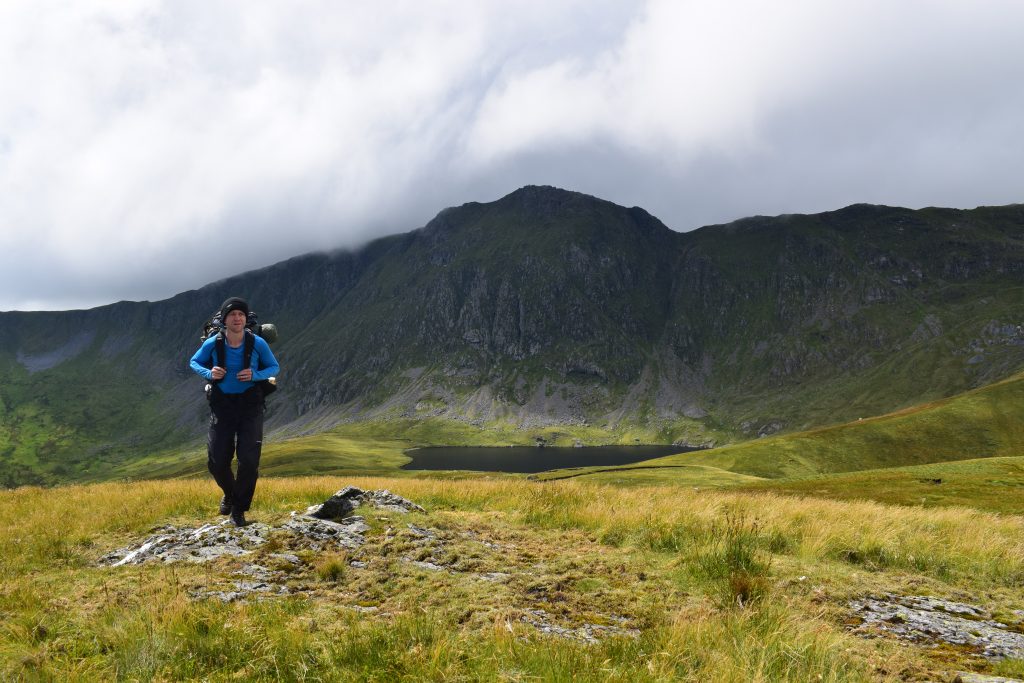
TM: Were you aiming for records specifically when you set out?
JF: Not really. My initial plan in the early days was to go on an adventure that I thought would be fun and enjoyable and I stumbled across these two books that I had called The Mountains of England and Wales by John and Anne Nuttall.
I’ve always loved climbing mountains, I’d drawn to them, it was a purer adventure idea that excited me. When I was thinking about it, I thought I could do it in six months when the weather was better, so I looked at the summer period.
I’ve always been quite driven if I give myself a goal, so I set myself the challenge to do it in Spring/Summer and it just turned out that it would be the fastest anyone had climbed those mountains if I made it. So it was a record by accident so to speak. Once I knew that it was going to be one it was a nice added motivation for me.
TM: Tell us about that lure of the mountains. What is it about them you love?
JF: There are so many aspects. There’s the freedom of it, the escapism. I think I was always drawn to mountains through struggling a bit with everyday life.
So getting away from the city and mobile phone reception and climbing a mountain for me was the ultimate form of escapism. It felt like an innate longing to be in nature. Humans used to be very connected to nature, but this modern world and with city-based living is a bit unnatural for us.
I’ve always felt this draw to be in the countryside. I can’t pinpoint exactly where that came from, it’s just always been within me. I also love the challenge and the exercise, I get a real buzz from that. Just being in the mountains makes me feel good and helps to relax me and give me clarity in my thinking. I feel it’s really good for mental health.
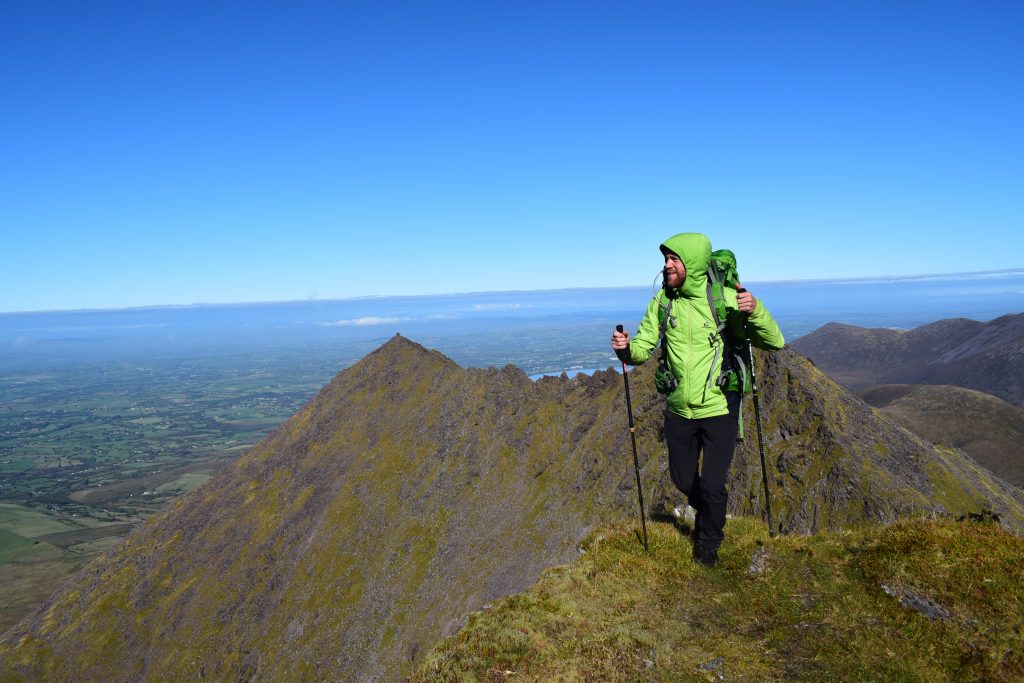
TM: How did you find it physically? Did you do any specific training?
JF: I’ve always kept myself fit, staying healthy and active to a reasonable standard. My approach for it was to launch myself into it and my fitness, strength and stamina improved as I went along.
TM: How did you find the mental side of things?
JF: I think mentally it was harder than it was physically. It was hiking, it wasn’t running and the distances I was doing were challenging but within my capabilities. The main challenge mentally was when the weather was bad. I found if it was sunny and I was hiking up a mountain there was a lot of joy in it.
When I was on the challenge trying to tick off peaks and it was raining all day and I climbed fifteen mountains in a weekend and didn’t see the view from the top of a single one and it was cold, wet and miserable and I was being battered by wind and thunderstorms and soaked to the bone, that was a real mental battle.
I had to try and stay positive and focus on the overall goal. There were a lot of times when I thought bloody hell why am I doing this? At the end of the day, I was doing this during my days off. Most people just enjoy them. So all of that was a mental challenge.
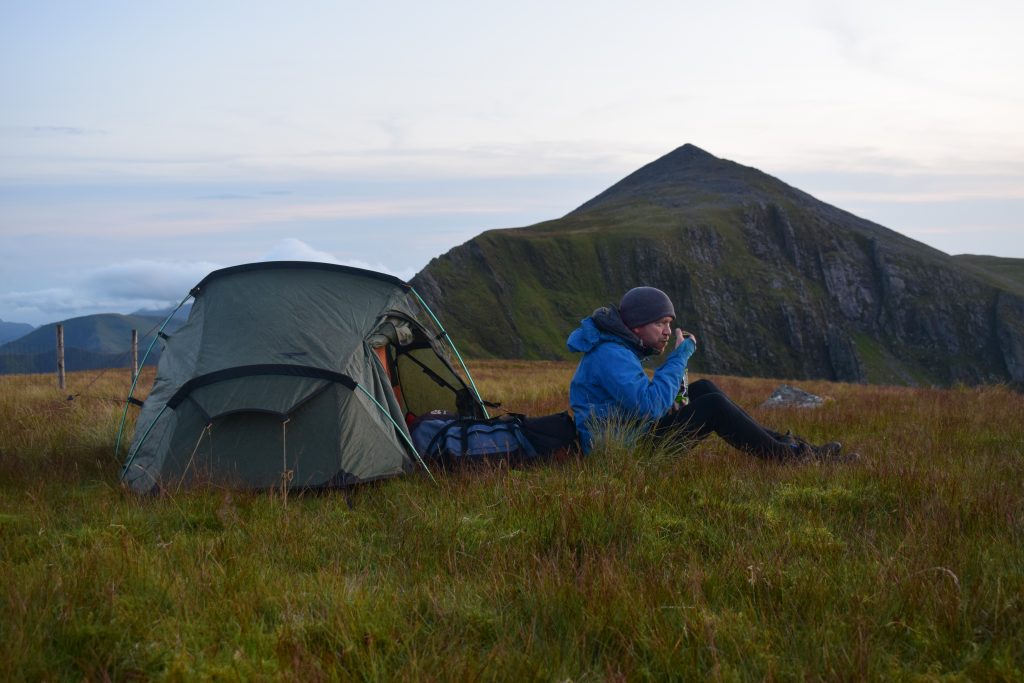
TM: Tell us about those low points…
JF: The low moments were mostly due to the weather. It wasn’t the best of summers so I was battered by horrible weather quite a lot. The absolute lowest moment I had was when in the Brecon Beacons when my tent collapsed at 3am in a storm. I woke up face down in a swamp and packed up and walked out of it.
That was a – what am I doing with my life kind of moment. I had a few other times in Snowdonia when a terrible storm hit. I was meant to be camping, but it was just impossible, so I slept in an emergency shelter which I luckily found.
The mountains can feel very inhospitable when the weather isn’t good, at points, it felt dangerous to be in the places I was in. Obviously I didn’t want to do anything stupid and end up having to call Mountain Rescue or do anything irresponsible. It was essentially a hiking challenge and most of the time not overly perilous.
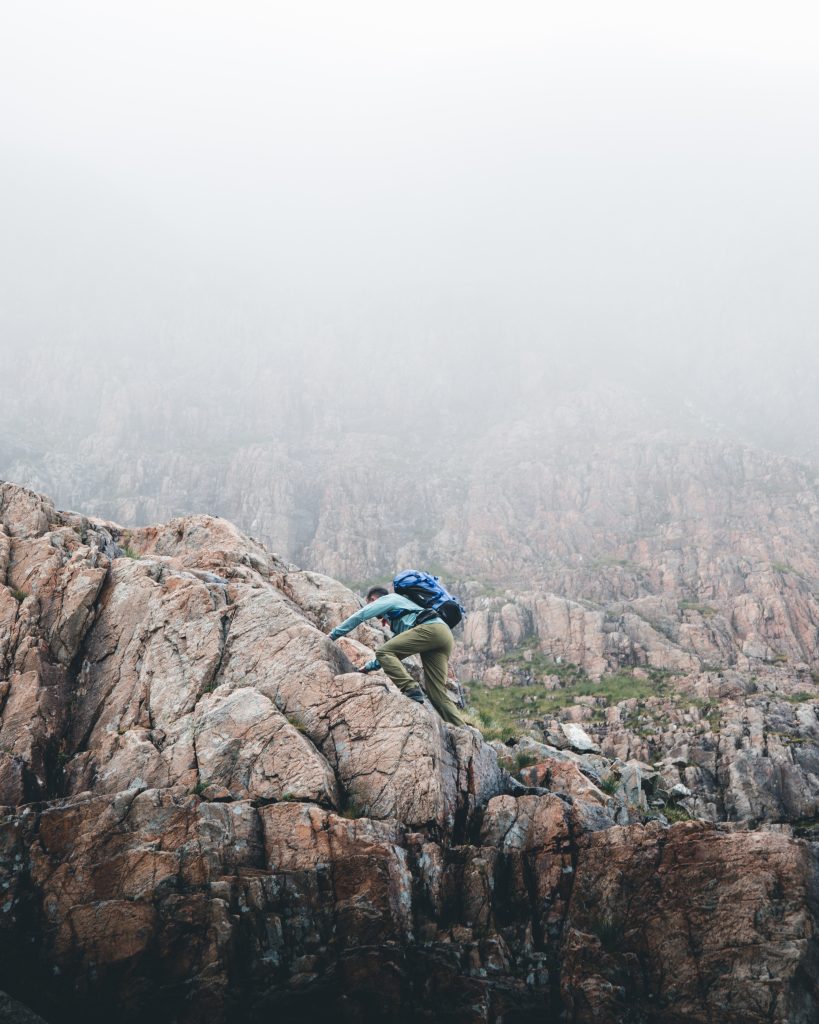
TM: Looking at the pictures there were some epic views you took in. That alone must have been worth all the effort?
JF: Definitely. What I quickly realised was that on a challenge like that I was going to go through a lot of hard times, you’re not going to get sunshine every day when you’re trying to do 446 mountains.
But I always felt the highs tasted a bit sweeter once you’d been through the lows. So I felt like I really deserved those good moments. Often I was up there alone with no one else around and they felt like special moments.
I don’t want to paint a picture that it was all hardship, there was a lot of that, but also amazing moments with incredible mountains and scenery. There were lots of life-affirming and memory forging times that I’ll remember forever.
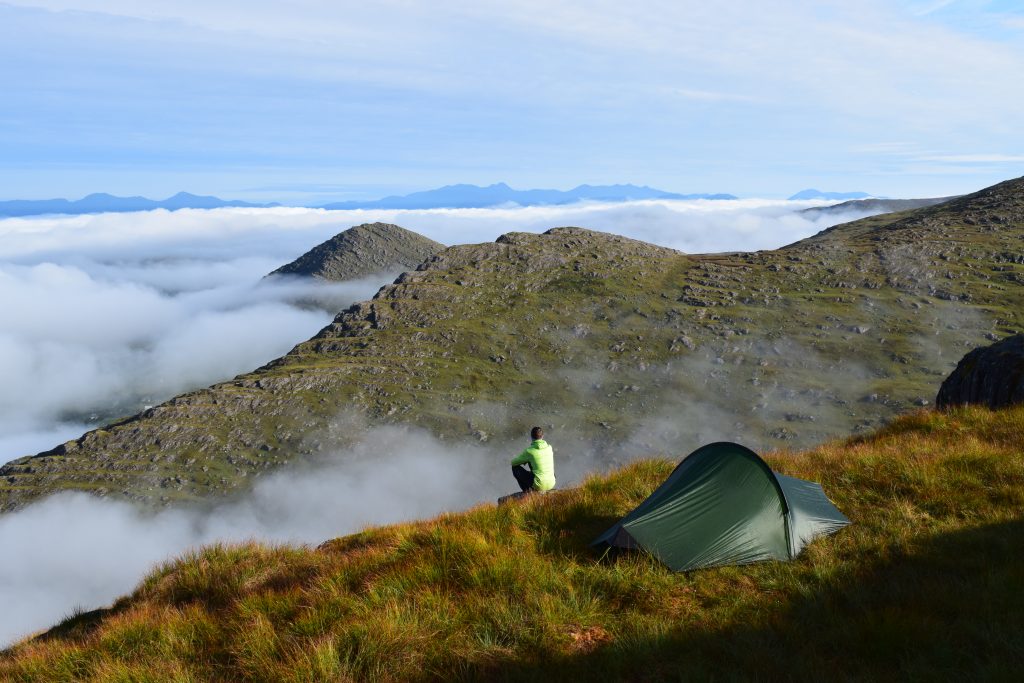
TM: Is there a mountain that stands out to you, a favourite maybe?
JF: They’re all different. But I loved the ones I did in the sunshine and hated the ones I did in the rain! I’m drawn to dramatic mountains, so ones with exciting ridge-lines and exposed pointy summits.
So I love some of the mountains in The Lake District like Helvellyn and Blencathra. In Snowdonia, I love Tryfan, Glyders, Crib Goch. Those were some of the ones that stood out.
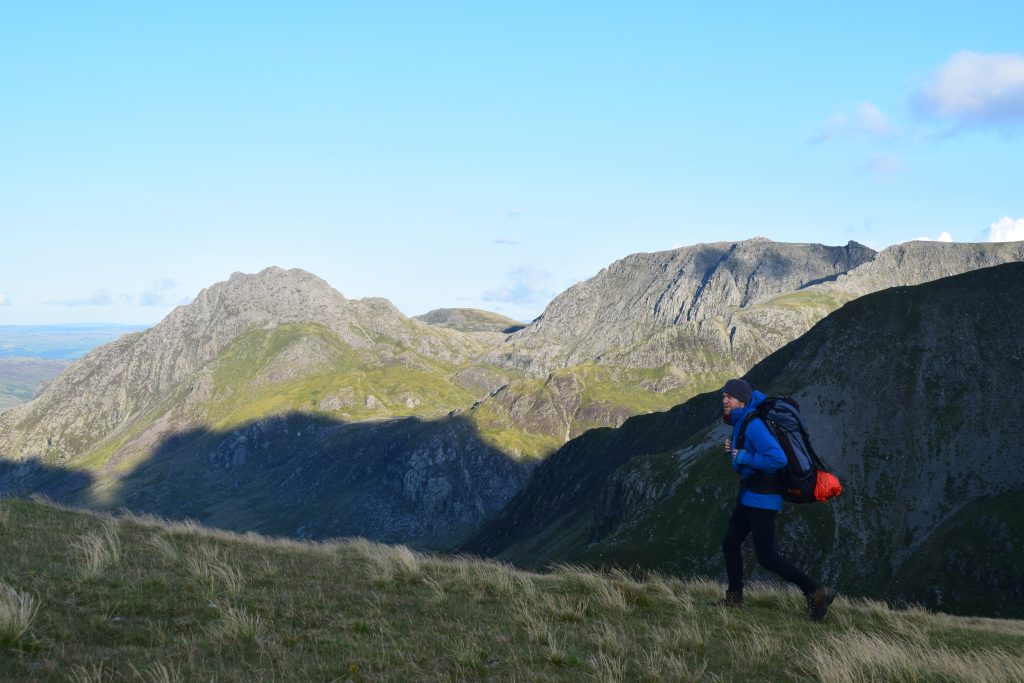
TM: Was there a piece of kit, aside from the obvious, that you took along that was helpful?
JF: When I started I didn’t use hiking poles. I was a little bit of the view that being a relatively young rambler, hiking poles were for OAPs.
But after my knees took a battering on the ascents and descents I quickly bought a pair of Leki poles and I love them. I’m pretty sure I would have had to have had a knee operation without them. They really took the strain off my knee joints and were a bit of a lifesaver.
TM: What have you learned from your experiences along the way?
JF: One of the things I wanted to do on my challenge was to get myself to have a bit of a digital detox. I did still take my phone with me for safety and I wasn’t perfect in sticking to that detox during the tough times I admit. I did at times watch Netflix on my phone in my tent.
But I felt like even though I wasn’t that addicted to my phone like everyone back in 2017, I’d become accustomed to living this online life and barely being able to go five minutes without checking my phone and looking at the Instagram notifications popping up and emails. That noise and incessant nature of modern life troubled me a little bit so I wanted to see if I could detach myself a bit from that.
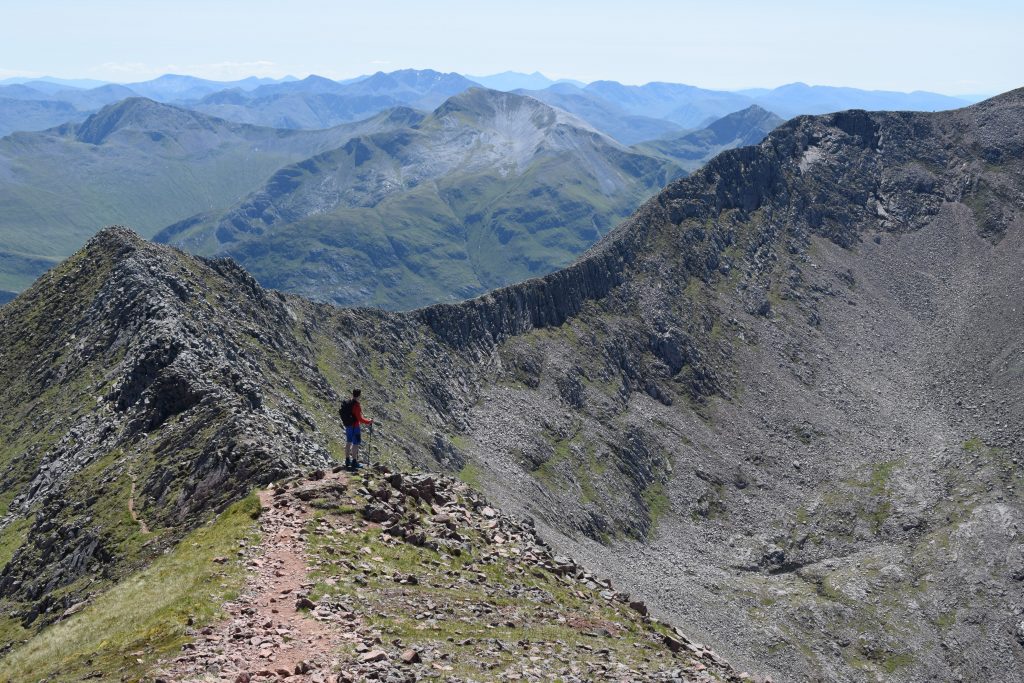
So, one of the things I feel like I learned is that life is a bit more humble, wholesome and rewarding if you turn off your phone and go and head out into the countryside.
You don’t have to do 446 mountains obviously, but I think everyone would feel better in themselves if every Sunday afternoon they just turned off their phone and forgot about everything for half a day and went for a walk in the countryside or in a green space where they live.
I think everyone can live a bit more adventurously and spend a bit more time outside and not in front of a computer screen. I think we’d all benefit from that.
TM: In terms of your happiness, have things changed in a positive way through this?
JF: I think so. I’m definitely happier and more content with my general set up of life so to speak. I like where I live and what I do for a living now. So I have a much better base of happiness.
I joke to people because I’ve done so many mountains over the last few years, 1001, that the mountains used to be the cure for all of my problems, but at some point along the way, they became the cause of all my problems because I was so tired and exhausted.
I feel like I’ve spent more time in horrendous rain-storms than most other people in Britain, Ireland and Scotland over the past few years. Next, I might have to look for mountains in the Caribbean or somewhere.

TM: What is next? Do you have another bucket-list to tick off?
JF: I’m contemplating plans for the rest of this year at the moment. I want to do some more long-distance hikes, rather than necessarily lists of mountains. I’ve also got some little trips abroad planned. But I am enjoying taking it a little bit easier.
I’ve had this clarity for the past few years of what I wanted to do and suddenly finishing that has meant I have to do some soul searching to figure out where I want to go next with it all. The strange thing is, even when you’ve done 1001 mountains in the UK, people still remind me that there are other lists of mountains I haven’t done.
So even though I’ve done the Munros in Scotland there are the Corbetts in Scotland which are over 2,500 feet, whereas the Munros are over 3,000 feet. So everyone keeps telling me I need to do those. We’ll see.
TM: You’re certainly going to be kept busy.
JF: Exactly!
Buy James’ book, Mountain Man: 446 Mountains. Six Months. One record-breaking adventure, HERE
Check out his website: https://www.jamesmforrest.co.uk/
And follow him on Instagram, Twitter & Facebook
Click the banner to share on Facebook



